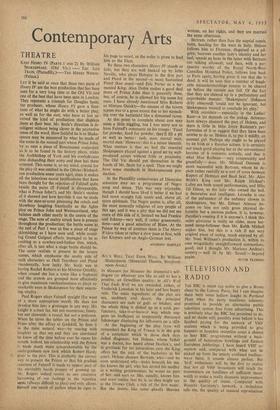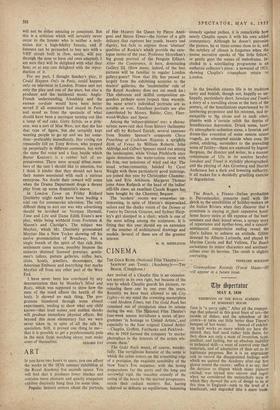TELEVISION AND RADIO
Tut: BBC is much too polite to give a Bronx cheer to the Labour Party, but I can imagine there were some hollow laughs in Portland Place when the party manifesto solemnly promised to provide an alternative public television system free from advertising. This is precisely what the BBC has promised to do, and no doubt will, possibly even before it has finished paying for the network of VHF stations which is being provided to give listeners in hopeless reception areas a chance to hear BBC programmes without a back- ground of heterodyne howlings and Eastern European jabberings. I have heard VHF re- ception and, compared with what can be picked up from the utterly confused medium- wave band, it sounds almost perfect. But 'hi-fi' enthusiasts will he the first to realise that not all VHF broadcasts will reach the transmitters on lundlines of sufficient band- width to make a really dramatic improvement in the quality of music. Compared with Western Germany's network, a technician tells me, the quality of musical reproduction will not be either amazing or consistent. But this is a criticism which will certainly never occur to the listener who is neither a tech- nician nor a high-fidelity fanatic; and if listeners can be persuaded to buy sets with a VHF circuit built in (few, surely, will pay through the nose to have old ones adapted), I am sure they will be delighted with what they hear, or at any rate delighted with the repro- duction of it.
For my part, I thought Sunday's play, It Could Happen Only in Paris, could happen only on television in London. France sent not only the play and one of the stars, but also a producer and the incidental music. Anglo- French understanding, friendship and the entente cordiale would have been better served if all concerned had stayed in Paris and saved us from the spectacle of what should have been a meringue turning out like a lump of sad cake. Gaby Sylvia, as a prin- cess, was a sort of Mae West; not that she has • that type of figure, but she certainly kept wanting people to go up and see her some- time—preferably immediately. Her roving eye repeatedly fell on Tony Britton, who popped up perpetually in different costumes, but with the same flat voice and a face beside which Buster Keaton's is a rubber ball of ex- pressiveness. There were several other mem- bers of the cast I should like to mention, but I think it kinder that they should not have their names associated with such a curious enterprise. No doubt their reward will come when the Drama Department drags a decent play from up some dramatist's sleeve.
In London Town on Friday Richard Dimbleby might easily have been leading a trial run for commercial television. The only difficult thing to sort out was why advertising should be lavished on Norman Hartnell, Time and Life and Dame Edith Evans's new play, while being withheld from Fortnum & Mason's and Claridge's. The subject was Mayfair, which Mr. Dimbleby pronounced Mayfair like a New Yorker showing off his native pronunciation of Broadway. Not a single breath of the spirit of that rich little settlement came across, possibly because the cameras shunned licensed premises, gentle- men's tailors, picture galleries, coffee bars, clubs, hotels, jewellers, shoemakers, the American Embassy and everything that marks Mayfair off from any other part of the West End.
I have never been less convinced by any demonstration than by Monday's Mind and Body, which was supposed to show how the state of the mind affects the health of the body. It showed no such thing. The pro- gramme blundered through some absurd experiments, tending to show what any child knows—that loud noises, and sudden shocks will produce immediate physical effects. But beyond this most elementary fact we were never taken in, in spite of all the talk by specialists. Still, it proved one thing to me— that it is possible to get a psychosomatic pain in the neck from watching clever men make











































 Previous page
Previous page